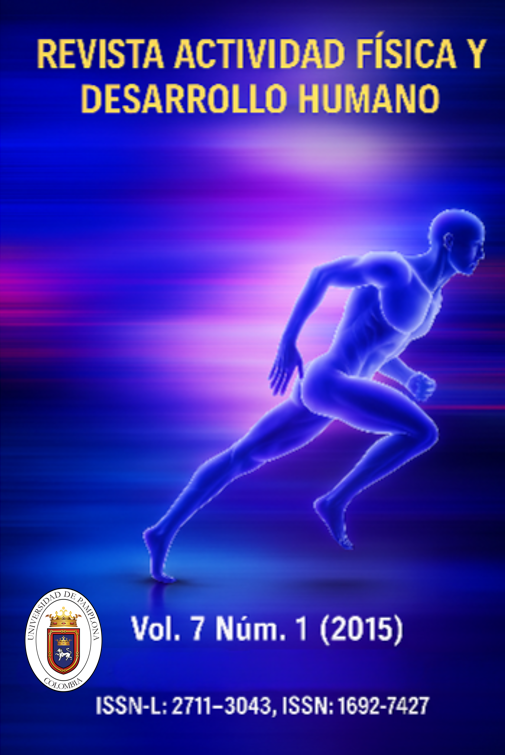El papel de la actividad física y el deporte como medios para el desarrollo de la salud psicológica de jóvenes universitarios
DOI:
https://doi.org/10.24054/afdh.v7i1.1644Palabras clave:
Salud mental, psicomotriz, actividades físicas, deporteResumen
Resulta de suma importancia el abordaje del papel que pueden ejercer las actividades de la Educación Física y la práctica del Deporte, en el caso que nos ocupa, el baloncesto, en la salud en general y en la salud psíquica o mental de los jóvenes universitarios que practican estos tipos de actividades de forma sistemática, en relación a aquellos que no las realizan. El poder determinar estas incidencias desde el punto de vista cuantitativo y cualitativo, permite a los profesores de educación física y del entrenamiento deportivo, realizar una mejor planificación de las cargas psicofísicas para sus deportistas y estudiantes y lograr incrementar los niveles de su preparación, aspectos estos que resultan significativos para el perfeccionamiento y mantenimiento de la salud. Es por ello que para la presente investigación se seleccionaron tres grupos de jóvenes universitarios: los que se dedicarían a la práctica del baloncesto, los que practicarían sistemáticamente la educación física y los que no realizarían ninguna de estas actividades. Los mismos fueron sometidos al estudio de un conjunto de indicadores psicomotrices mediante un diseño transversal caso control durante el cual los sujetos fueron medidos y evaluados, mediante las técnicas preceptúales, de las tensiones musculares, las reacciones simples, la reacción al objeto en movimiento y otras técnicas psicomotrices. Para el procesamiento de los resultados fue utilizado el modelo estadístico abreviado de ‘URBAJ’ que permitió obtener la media, la desviación, el coeficiente de variación, el error de la media, el grado de autenticidad de los resultados y comparar los grupos. Los resultados reflejaron que los sujetos sometidos a las variables independientes deporte baloncesto, el sexo y la práctica de la educación física, mejoraron cuantitativa y cualitativamente de forma notable en la mayoría de los parámetros de las variables psicomotrices, en comparación con los sujetos que no realizan estas actividades.
Descargas
Referencias
Canizares Hernández, Marta. (2008). La Psicología en la actividad física. Su aplicación en la educación física, el deporte, la recreación y la rehabilitación. Ciudad de La Haba na. Editorial Deportes.
Constitución de la Organización Mundial de la Salud (1946). Conferencia Internacional de Salud. http://apps.who.int/gb/bd/PDF/bd47/SP/c onstitucion-sp.pdf
Domínguez. Laura, (2000) Ponencia presentada en mesa redonda sobre los problemas de la periodización del desarrollo, XXI Congreso Interamericano de Psicología. La Habana Cuba. Palacio de las Convenciones
Estévez, C ‘’y Cols’’ (2004) La Investigación Científica en la Actividad Física: su Metodología. La Habana. Cuba. Editorial Deportes.
Gorbunov. B. D, Guenadi, (1988) Psicopedagogía del Deporte. Moscú. Editorial Cultura Física y Deportes. URSS.
Iriarte. S ‘y Cols’ (2011). Actividad física y salud mental, ¿dúo inseparable? Metas de enfermería, Vol. 14, Nº. 5, págs. 64-69
Knapp, Rodríguez. Elisa (2007) Psicología de la Salud. Editorial Felix Varela. Ciudad de La Habana.
Martinó, C ‘y Cols’ (1994) Sobre Psicología del Deporte. Suplemento No.15. Boletín Científico- Técnico. Inder. Cuba
Needle. R; J. F. Sallis; and C. B Taylor (1985). «The relation of physical activity and exercise to Mental health. Public Health Rep. p. 195–202 Puni,
A. Z y T.T. Changarov (1979). Psicología de la Educación Física y el Deporte. Editorial Científico Técnica. Ciudad de La Habana
Terris. M (1980) y L, Salleras (1985) La revolución epidemiológica y la medicina social. Ed. Siglo XXI, Madrid.
San Martín. H, y Pastor (1984). Salud comunitaria. Teoría y Práctica, Díaz de Santos. Madrid.
Descargas
Publicado
Número
Sección
Licencia
Derechos de autor 2015 ACTIVIDAD FÍSICA Y DESARROLLO HUMANO

Esta obra está bajo una licencia internacional Creative Commons Atribución-NoComercial-SinDerivadas 4.0.











